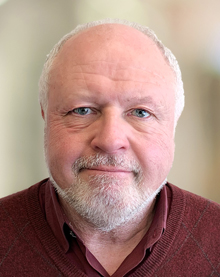Printed in the Spring 2021 issue of Quest magazine.
Citation: Smoley, Richard, "From the Editor’s Desk" Quest 109:2, pg 2
 Soon after I first suggested that we do an issue on Ecology, it became clear to me that I was not thinking of the term in its usual sense.
Soon after I first suggested that we do an issue on Ecology, it became clear to me that I was not thinking of the term in its usual sense.
The environmental crisis is grave, and its size and degree would be hard to overstate. But there is comparatively little we at Quest can say about this subject. Very likely we have no more access to information about it than you do. The only thing left would be sermonizing, which is usually tiresome and counterproductive.
Instead I was thinking of ecology in a deeper sense—our interrelation with the world and the universe, not merely in biological terms, but in light of the unseen realms. Hence we have retitled this issue as “The Ecology of Spirit.”
In this issue’s Viewpoint, Barbara Hebert discusses ecology in this sense. If we grant that there is an astral realm—a realm of thoughts, forms, and images that is no less real than the physical one—we have to consider how we may be polluting it. Many people are generating extraordinary amounts of emotional toxic waste, and they are by no means limited to any one sector of the ideological continuum. As often happens, people employ the abuses of the other side to pardon their own.
The backdrop of the environmental crisis is the materialistic worldview—the belief that nothing exists except for what can be apprehended with the five familiar senses (augmented by certain apparatus); beyond that, there is nothing.
This worldview is cracking, to judge by the many news stories about quantum physicists suggesting that consciousness rather than matter is the ground of the universe. But materialism is still the default intellectual habit.
For the last two centuries, the materialistic worldview has been used to justify exploitation of nature. Over the last fifty years, as the ecological crisis has become more and more acute, some in the intellectual world have taken another tack: instead of regarding the earth and all therein as merely a set of “natural resources” to be used at our whim, some worry whether the human race is itself a cancer on nature and whether the planet would be better off without us.
What, then, are we supposed to do? Kill ourselves off as a matter of principle? The world was shocked by the mass suicides of cultists like the People’s Temple and Heaven’s Gate, which were recognized as instances of collective madness. Sacrificing the human race to save the earth comes across as still more insane.
This issue contains an article of mine on G.I. Gurdjieff’s view of what might be called astral ecology . In his colossal work Beelzebub’s Tales to His Grandson, he suggests that humans exist as means of generating certain forces that are necessary for the care and feeding of the cosmos. These forces are generated, says Gurdjieff, by the “conscious labors and intentional suffering” of people working toward self-perfection. If we do not strive for perfection in this way, these forces will be extracted from us regardless—through death on a mass scale. Gurdjieff suggests that war exists as a side-effect of the collective failure of humanity to perfect itself.
These ideas may seem outlandish, but at least they provide some explanation for war, which has been a consistent feature of human history even though everybody professes to hate it.
For my part, I neither endorse nor reject Gurdjieff’s views (although they have some flavor of truth about them). But I think there is reason to believe in the traditional sacred ternary of the Chinese: heaven, earth, and man (or humanity if you prefer). We are the only beings that we know of who are capable of consciously uniting heaven and earth—that is, the visible and unseen realms. I believe that is very close to our function as a species on this planet.
Our failure to live up to this task has had the most grievous consequences. In the first place, it leads to a distorted valuation of the material realm as the whole of reality rather than a mere part of it. In the second place, at some level we realize that we have not been doing the job that we were put here to do, leading to the anomie, dissociation, depression, alienation, and anxiety that are practically universal in the present-day world. In the third place, our failure to fulfill our role in the subtle ecology of the planet may be doing more harm than all of the fluorocarbons and fossil fuels put together, in ways that we have not imagined.
In short—yes, the human race is responsible for cleaning up the environmental mess that it has made. But I don’t believe that’s enough. Doing no harm (or undoing the harm that one has done) is only a part of a complete ethical program. We must also embrace a positive role for ourselves, and it is not one that can be cooked up as a mere placeholder. It must be genuine.
What, then, does it mean to unite heaven and earth? Are there techniques for it? Meditations? Rituals? Many of these no doubt serve such a purpose, but I don’t see it as my place to tell readers what they might be. Nonetheless, I do believe that if we take this cosmic union as an objective in our lives, the means will be given to us.
Richard Smoley

